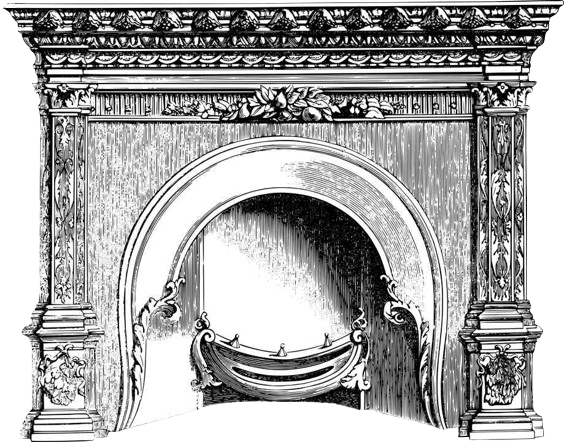Almost 1000 years ago monks, scholars, poets, and the like lamented the invention of a new technology that was going to destroy the fabric of society: the chimney.
Until the late 12th Century, in Northern Europe, people ate their meals together in common rooms, dressed in shared spaces, and even shared sleeping areas. Without the chimney, fires could only vent through simple holes in the roof making it impractical to have them centered in smaller rooms. Thus there was a central “hall” where much of the activity of a “great hold” would take place.
However, with the invention of the chimney around 1200 CE, buildings could now be partitioned into smaller spaces, allowing the Lord and Lady to have their own chambers, separate from the rest of the household, and also allowing hierarchical divisions among the household itself to be made more distinct.
At the time, a good amount of writing, criticism, and even art was dedicated to how this shift would bring about the downfall of society. By separating people from each other, class divisions would be fostered and people would think more of themselves than of the group.
It seems ridiculous to us now to think of the chimney as some “new and destructive technology” but it’s also hard to deny that these predictions came true. There were, of course, many, many other factors in the rise of aristocracy in Europe post-1200, but the physical separation of the classes that the chimney allowed should not be laughed off.
Flash forward to 2022 and the internet has been subject to much similar criticism for the last 30 years: that it will (or has) destroyed “the fabric of society.” Of course, it has its proponents who tout the freedom of information it provides, the democratization of education, and so on. And they, are, of course, correct. The internet has changed our world in many ways for the better.
But I also have to ask if it hasn’t also done much the same as the chimney. By allowing us, especially during the pandemic years, to isolate ourselves while still feeling we are not in isolation, has it not also accelerated the world’s currently extraordinary socio-economic disparity?
Just like the rise of the European aristocratic class, there are clearly dozens of factors (again, especially during the pandemic years), that have contributed to rise of the 0.01%. But it seems like our sense that it is now “OK” to sit alone in our isolated houses and still be “connected” to the rest of the world might also have had something to do with it.
There has always been a conflict between our drive to isolate our families for their “safety” and our drive for our families to be part of a larger social unit with the safety that provides. The internet has given us the illusion we can have both simultaneously.
But this is not the case. There is a wealth of empirical research which demonstrates that being in the room with someone is cognitively and emotionally quite a different experience from talking to them on Zoom. And yet, on a conscious level, we think it is the same experience.
I have to wonder if this illusion of connectivity created by video calls (and before that texting…and before that email…), allows us all to believe we are still in touch with our fellow man, when, in fact, we have lost the actual connections that being in the same room with them brings.
If this is correct, it would help to explain the increasing lack of social responsibility, the increasing divisions in society, the increasing sense that “I” matter more than “you”.
